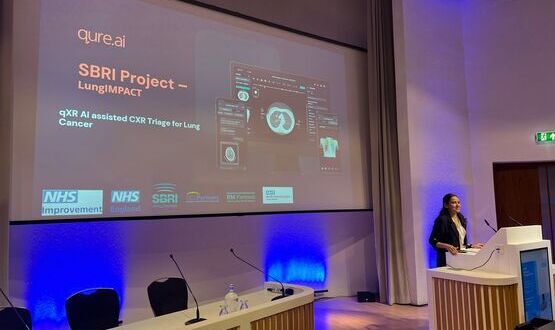Qure.ai AI collaborative trial is underway to speed up lung cancer diagnosis
- 5 October 2023

The LungIMPACT trial – a collaborative study between UK academia, NHS hospitals and Qure.ai is now gathering real-world evidence of AI-assisted diagnosis of lung cancer.
Using Qure.ai’s qXR solution, the LungIMPACT trial is triaging chest x-rays referred by GPs with the goal of identifying the presence of suspected lung abnormalities and then delivering immediate reporting on them.
By accelerating the rate at which any abnormalities are picked up, it also speeds up how quickly patients can be referred for a CT scan. This helps to ensure timely diagnoses and that treatment planning can be initiated at the earliest opportunity, helping to improve health outcomes for patients.
Two hospital trusts have implemented the Qure.ai tool, with further NHS sites set to be joining the trial within the next couple of months.
University College London Hospitals NHS Foundation Trust and Nottingham University Hospitals NHS Trust are using the technology, while Qure.ai will be analysing and reporting independently all of the data.
The study is being jointly led by Professor David Baldwin, respiratory consultant at Nottingham University Hospitals and national clinical lead for lung cancer at NHSE/I, and Dr Nick Woznitza, consultant radiographer at University College London Hospitals and clinical academic at Canterbury Christ Church University.
Professor Baldwin said: “We have previously found that only a 15-day reduction in time to diagnosis increases survival by 200 days and immediate action on a chest X-ray that is suspicious for lung cancer reduces time to diagnosis by 30 days.
“AI may be a way to identify suspicious chest X-rays rapidly. Studies with AI are needed to evaluate the clinical value and impact to ensure safe and effective implementation.”
The work was commissioned and funded by the NHS Cancer Programme, with support from SBRI Healthcare and the NHS Accelerated Access Collaborative.
Darren Stephens, senior vice president and commercial head UK and Europe, Qure.ai, said: “The earlier cancer can be detected, the better chance patients have of survival. AI can be helpful in expediting diagnosis, and we hope that studies like this will gather the evidence needed to validate its role.”
The LIBRA study – a collaboration between The Royal Marsden NHS Foundation Trust, The Institute of Cancer Research and Imperial College London – determined in May this year that AI could help speed up the rate of diagnosis for lung cancer.




